Home > Articles > The Archives > Benny and Vallie Cain
Benny and Vallie Cain
Reprinted from Bluegrass Unlimited Magazine
May 1972, Volume 6, Number 11
Husband and wife singing teams, while not uncommon in Country-Western music, are very unusual in bluegrass. Probably one of the best known such team are Benny and Vallie Cain, who have, for more than twenty years, performed their own distinctive brand of music; a mixture of old-time and early hillbilly styles, combined with the drive of bluegrass.
They are not professional musicians, preferring instead to play on a part-time basis. They have, however, been very active over the years, often playing five and six nights a week in clubs, appearing at hillbilly parks on weekends, while at the same time making weekly radio broadcasts. Their recordings, unfortunately few in number, nevertheless contain some really rewarding and significant music, and an impressive list of outstanding musicians have been members of their band.
James B. Cain was born May 21, 1921, in New Haven, Connecticut. When he was three years old, his family moved to Berkeley Springs, West Virginia. Benny says of his musical influences: “Jimmie Rodgers has always been my inspiration as an individual singer. When I was a kid, we had a bunch of his records on the old wind-up phonograph, and I used to wear them out. My dad and mother never had any Monroe Brothers records at home, or Blue Sky Boys…they came along later. They had Jimmie Rodgers, Carter Family, Vernon Dalhart, and some others practically unknown now.”
When Benny was about eight, he took up the harmonica, then a little later, attempted to learn the five-string banjo. “An aunt gave it to me, and I used to walk down to the mail box…we lived on a rural route…and get the mail carrier to tune it for me. I used to plunk some on that, but I never did learn to play it very well.” He started playing guitar when he was twelve. “This neighbor boy used to stop by on Sundays. He had a guitar, and we used to jam a little bit…I got interested in the sound of the guitar, and I finally ordered one being advertised over a Pennsylvania country station.”
In the late 30’s, Benny began listening to WSM. “I used to make it a point to listen to the Grand Ole Opry, and catch the Bill Monroe show, and the Crook Brothers band, and The Possum Hunters, Lew Childre and many of those.” By now Benny, in his late teens, was good enough on guitar to play with various local musicians at social gatherings. “We had some guys around our area that would play for local square dances. Back then, they usually had square dances in homes, in the living room. If they needed a guitar player, a lot of them used to stop by and ask me to come along. Of course, we were very unprofessional.”
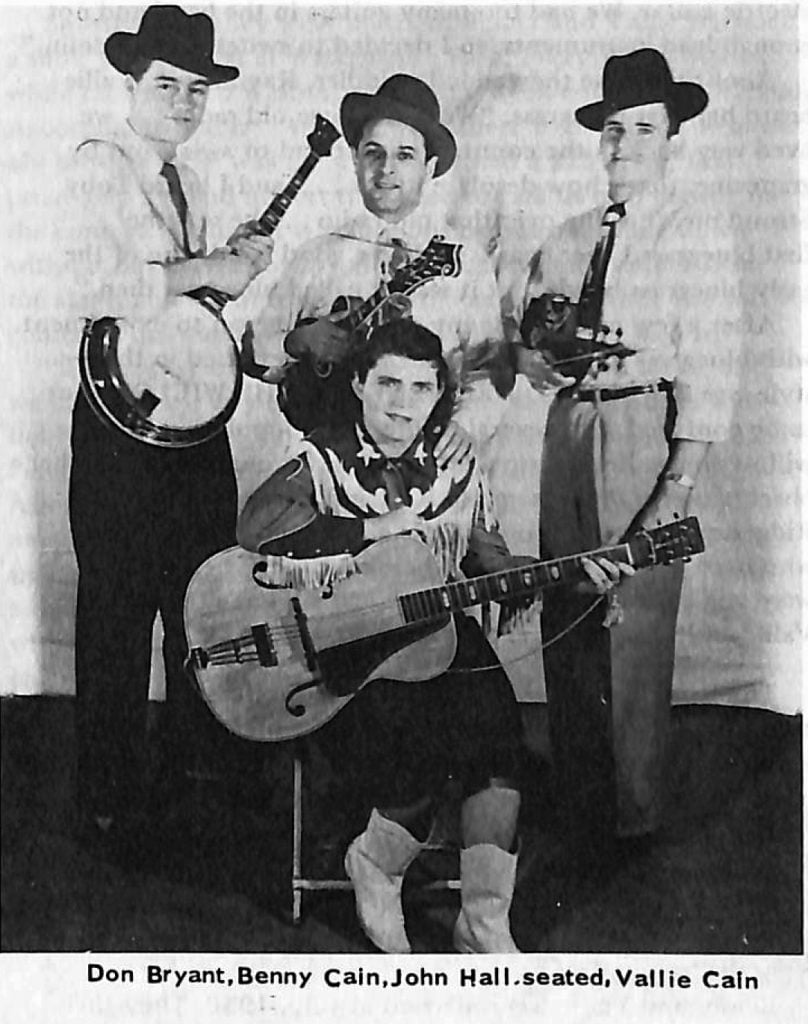
After graduating from high school, Benny attended Strayers College in Washington, D.C. His interest in music continued: “I played some around Baltimore, and back home in West Virginia on week-ends. I bought my first Martin guitar, a little 00-18, when I was working in Baltimore in 1942.”
In August 1942, Benny joined the U. S. Navy, serving four years as a gunnery officer. He participated in the invasions of North Africa, Sicily, Italy, and Normandy. He then served with the Pacific Fleet in the Philippines, Guam and China. He still managed somehow to find time to play music. “I played with other Navy boys, on different ships in the flotilla. We’d go from ship to ship and find somebody that could play. I played a lot with this one boy from Louisiana who played fiddle, and another boy that played guitar. I had a guitar then, then I met a boy from Charlottesville, Virginia, who played mandolin, and for a long time we used to all get together. Every time we hit port, we would look each other up.”
Upon his return to civilian life in 1946, Benny went to work for the U. S. Treasury Department, in the Alcohol, Tobacco and Firearms Division, the same agency that employed the late Elliott Ness. Benny still works for this division as a Firearms Enforcement Officer.
Vallie R. Kave was born July 19, 1927 in Kitzmiller, Maryland. When she was seven years old, the Kave family moved to Berkeley Springs, West Virginia. Most of the family were musicians: “I think I started about the same age that Benny did…about twelve. My father played a lot. He played the old type banjo style, with one finger…wouldn’t be any roll to it. Then he’d play guitar, and when I saw him pick the guitar, I wanted to learn. The first thing I ever learned to play was YOU ARE MY SUNSHINE…no rhythm to it or nothing, just single picking. This was a little Stella guitar…far from the Martin that I have now. It was about fourth-handed when I got it…really beat up, but that guitar meant more to me than anything in the world.”
Vallie attended Berkeley Springs High School, then worked for a clothing manufacturer until she and Benny were married. It was through music that they first met in 1947.
Benny recalls: “I had an aunt in Berkeley Springs who was a school teacher, and one of Vallie’s brothers was her student…and she happened to mention that this boy had a brother and sister that played. So she told me that sometime when I was up there on the week-end, she would invite them over, if I would bring my guitar. So we arranged one week-end to get together.” Soon they were meeting whenever Benny could come home.
It wasn’t long before they began to gather some musicians around them. “We met another boy who lived twenty miles away in Paw Paw. We were passing his house one day and they were having a jam session on his front porch. He was playing guitar Butterball Paige style. We liked it…we were always fans of Ernest Tubb’s music. This was shortly before bluegrass began to make the scene.”
In 1949, Benny and Vallie organized their first band, the Country Cousins. Initially, they featured the then modem sound of country music, “like Ernest Tubb, Carl Smith…stuff like that.” The group consisted of Benny, the Kave Sisters, Vallie and Virginia, their brother Ford, and Kenny McBride. Vallie recalls that a great portion of the vocal work was carried by she and her sister. “We sang a lot of duets. In fact, we were featured mostly, more than anything. She and I did a lot of spirituals. We weren’t bluegrass then…Benny knew about bluegrass, but I didn’t know a thing about it.”
Almost immediately after organizing, the Country Cousins landed a spot on station WINC, Winchester, Virginia, about 38 miles from Berekely Springs. “There were a couple of business men around town that were willing to sponsor us…one restaurant and a grocery store. They signed a contract to sponsor us, and we had about two weeks to practice before we went on the air.” The program aired Saturday mornings, from 9:30 until 10 o’clock. It was during this period that Benny took up the mandolin. “After we organized, we found we only had one lead instrument, which was an electric guitar. We had too many guitars in the band and not enough lead instruments, so I decided to switch to mandolin.”
About the time they added a fiddler, Ray Shreve, Vallie heard her first bluegrass. “We had a huge old radio…we lived way back in the country, almost had to swing out by grapevine, that’s how desolate it was…and I heard Toby Stroud on Wheeling over that old radio…he was the first bluegrass I ever heard. He had a good band, one of the early bluegrass bands, but it wasn’t called bluegrass then.”
After a few months, Benny and Vallie began to experiment with bluegrass harmony. The first song they tried in this style was WE BURIED HER BENEATH THE WILLOW, not to be confused with several of the more popular weeping willow songs. Benny provides some background on this rather obscure piece: “It was an old Karl and Harty, Cumberland Ridgerunners song, about a little girl named Marion Parker, who used to be a member of their band. She died while they were still playing over WJJD in Chicago. That’s the first song Vallie and I ever tried as a duet.”
The band had not, however, switched to bluegrass instrumentation. “We were trying to sing these bluegrass songs in with the type of music that we were playing…trying to break ourselves in harmonizing along bluegrass lines.” Gradually, their sound became more and more bluegrass oriented. “Our music turned to bluegrass…and old-time country tunes. We tried to stay away from the commercial songs, like we still do, and stick to traditional stuff, or original songs and instrumentals.”
Benny and Vallie were married in July, 1950. They then moved to Washington, D. C. to be nearer Benny’s work. However, they continued the program at WINC. “Then the band began to break up…Kenny McBride left and joined another band…and the fiddle player couldn’t travel as much as we wanted to.”
Shortly after they were married, Benny and Vallie attended a show and contest at Watermelon Park, Berryville, Virginia, while returning to Washington from a weekend in West Virginia. According to Vallie: “We just went there to listen to the music. My brother Offie was there…they had a $25 prize, first prize only…and my brother tried to talk us into getting in the contest. We didn’t want to, but he put our name down without our even knowing. So they called our number from the stage, and we were sitting in the audience. What else was we gonna do but enter it? We entered the thing and won it.”
“There were other bluegrass musicians around there, but we didn’t know any of them. We found this boy out in the field, playing his banjo and we liked it. His name was Richard Peters. He had a friend named Larry Leahey, who played bass.” After jamming together, Benny and Vallie decided to form a new group, and offered the two musicians a job. At this point, the Cains began playing strictly bluegrass and old-time, and have never deviated from this style. They continued at WINC with the new band. “We were sponsored by the Jewel Box chain of jewelry stores. I understand that years ago, they sponsored Dinah Shore down south…this same chain. They catered to country music.”
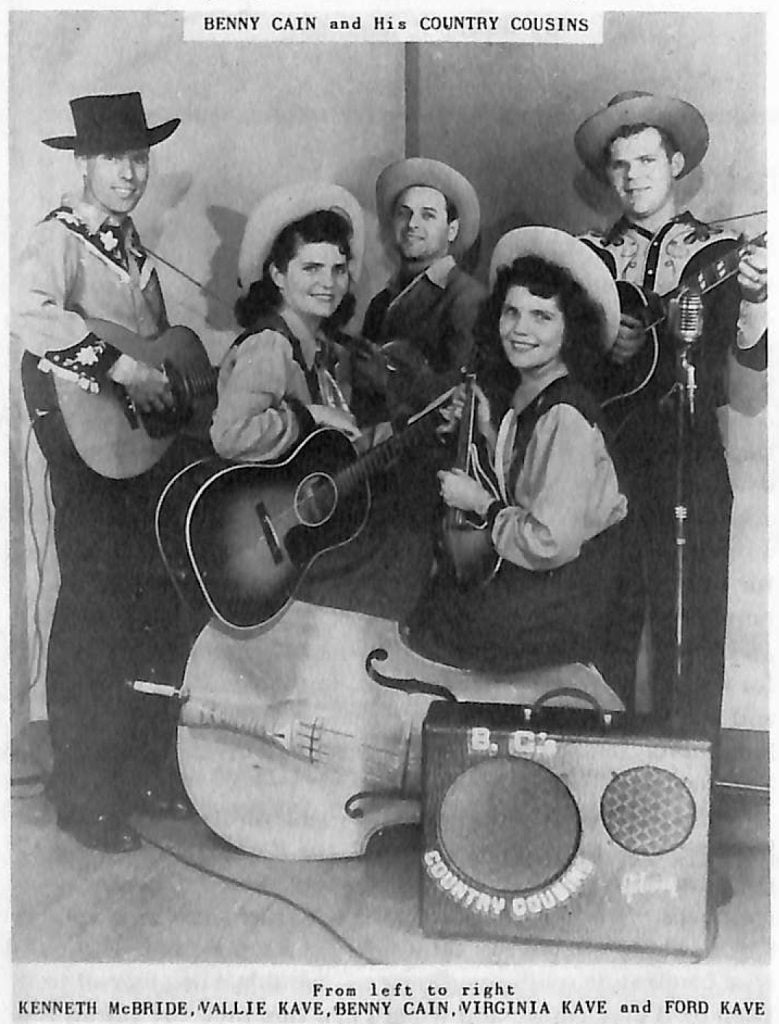
It was during this time that they were briefly associated with the young Patsy Cline. “Patsy would hang around the radio station on Saturday, to watch the various bands through the window broadcasting. We had her a couple of times on the show. She was trying to break in as a singer, and she had a good strong voice. She was more commercial…she never sang the bluegrass style numbers. We suggested that she appear with another band that was working there, who had a different kind of music, more suitable to her style of singing. It was Sammy Moss and the Blue Ridge Mountain Boys from our hometown.”
After switching to bluegrass, Benny and Vallie decided to change the name of the band. They dropped Country Cousins in favor of Country Clan. They also added a fiddler. “We met Johnny Hall from Front Royal, Virginia, and he started playing fiddle with us. We were playing five nights a week at Jo Dell’s Restaurant over in Washington…and then we used to drive every weekend to play for a dance at Mt. Savage, Maryland. We played a lot then, because there wasn’t that many bluegrass bands around.”
In 1953, Benny and Vallie began broadcasting over WGAY Silver Spring, Maryland. “We taped the show for WINC, and then we’d go to Silver Spring, the Curly Smith show, and have it live…we decided to do the live show every week at Silver Spring, because it was closer. We continued at WINC live again, after we stopped the show at WGAY.” Donny Bryant was now working with them as banjo player. “We were living in Arlington, Virginia…and Donny lived about half a block away. We used to hear him sitting on the back steps in the evenings picking his banjo, and that’s how we met him. Richard Peters had to go in the Army about that time, so we hired Donny.”
In 1955, the Country Clan began appearing on station WSIG in Mt. Jackson, Virginia. “The owner of WINC, Dick Lewis, began buying up some other stations, and building some new stations, so he opened up one in Mt. Jackson. He decided he would let us do a broadcast there at 11:30 to 12:00. We still continued our half hour broadcast at Winchester, and after that was over, we would jump in the car and ride over to Mt. Jackson, about 40 miles further down the Shenandoah Valley, for another half hour show.”
Early in 1956, Donny Bryant left the band. “He went with Buzz Busby for a little while, then I think he wanted to make music his full-time occupation, so he went with Mac Wiseman.” Pete (Roberts) Kuykendall was hired to take Bryant’s place. Other members of the group at the time were Scott Stoneman on fiddle and Don Mulkey on bass.
In August of 1956, Benny and Vallie cut their first recording, a 78 rpm for Adelphi Records. Now very rare, this record is much sought after among collectors. According to Benny: “I had corresponded with Mr. Warner, president of the company, and one time when I was in New York City, I stopped in to see him…he was interested in bluegrass music. He said if we wanted to record for them to work something up, and if he liked it he would release it. He had maybe five or six country bands recording for him, mostly from around the New England area, but I think we were the only bluegrass band he ever recorded.”
The Country Clan were very busy in those days, “We made personal appearances at some of the drive-in theaters up and down the valley, indoor theaters, some of the carnivals, and festivals around Bayse, Virginia and Uncle Tom’s Park.” They also appeared regularly at the “Country Fair” at Mt. Jackson, Virginia. “It was like a Grand Ole Opry or a WWVA Wheeling type of jamboree, held in the theater every Friday night. They had acts like Patsy Cline and Bill Clifton, and they would tape the show and play it back on the radio (WSIG) Saturday morning.” In addition, they were appearing three nights a week at the B & J Restaurant in the Georgetown section of Washington.
Sometime in 1956, they started to phase out the live shows at WSIG and WINC. “We decided it was too much driving, and we would only go up every other week and do live shows, and the rest of the time they would play tapes.” Every second week they would broadcast live, leave tapes for the following week, and pick up the tapes from the previous week. “We would pick up the mail so it wouldn’t get old, keep bookings up to date, and the announcements…kept them current.”
The following year, the decision was made to stop broadcasting on the Winchester station. “It was a little bit too hectic trying to continue at both stations and do live programs both places, especially when both stations were in the same area. WSIG had more power than WINC…it was covering a larger area, so we decided to discontinue the program at WINC.”
Benny and Vallie were now performing often as a duo, with no band. “We still had our show at WSIG, and sometimes it would get down to just Vallie and I. Ocassionally we’d pick up a banjo player, or fiddler. We didn’t have any solid group there for a long while. Nobody seemed to be available. We even had Art Wooten play fiddle with us a few times, when he was around town. Smitty Irwin played banjo with us for a while, when we were working at a club on Pennsylvania Avenue in Washington.”
In April 1957, they formed a new group. “Vallie and I…just the two of us…were working at a club in Annandale, Virginia. One night a couple of fellows came in…a banjo player and a fiddle player. During intermission, they came over where we were sitting. They said they played…one thing led to another…they had their instruments in their cars, so we invited them to play with us on the next set. We thought it sounded pretty good, so we reformed then…with Jimmy Delozier on fiddle, and Johnny Powell on banjo. Don Mulkey came back a little later on bass.”
They were playing the Madrid Restaurant in Washington, D. C. in late 1957, when they hired Pete Kuykendall the second time as banjoist. “Johnny Powell had to quit, then we got Pete to come back.” Pete left again in the spring of 1958. “After he left, we hired Jake Lester, later when Jake quit, we got Don Stover. He played that summer with us.”
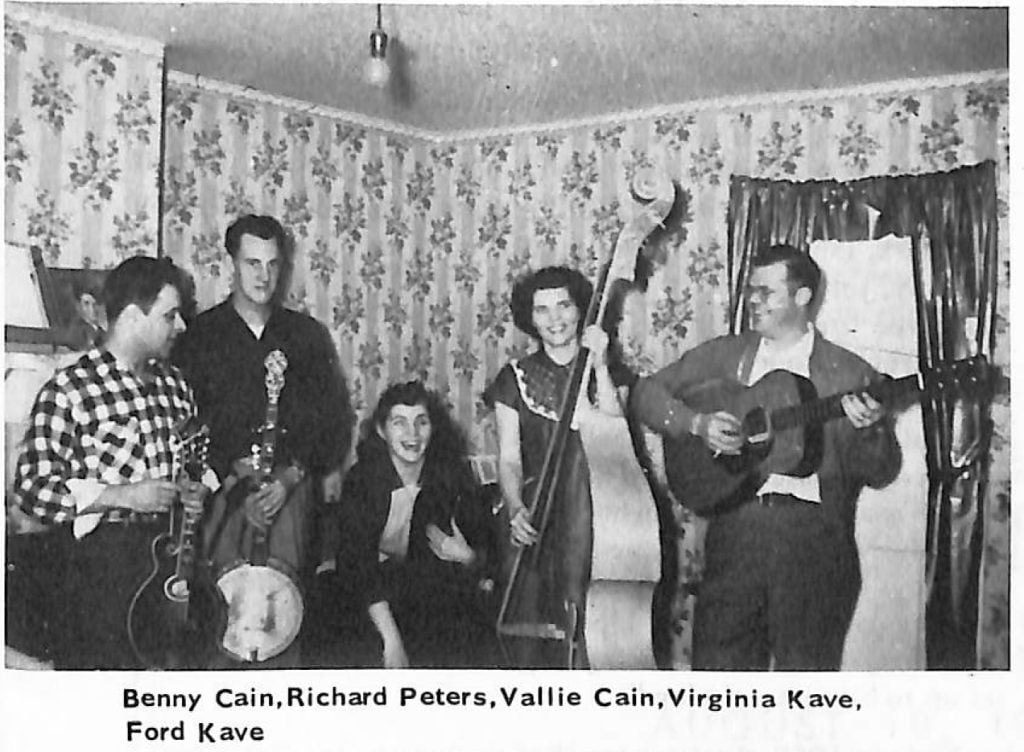
The next several years saw engagements in Washington, at the Pine Tavern and Freddie’s Restaurant. Bill Emerson was with them for a while during this period. They continued the program at WSIG in Mt. Jackson, making appearances at Oak Leaf Park, Luray, Virginia and similar outdoor shows. It was at Luray, July 4, 1960, that Emerson, while with the Country Clan, won first place in the banjo contest. The prize was a new Earl Scruggs model Vega banjo, the first one off the line.
Benny and Vallie were, by now, quite well known for their unusual repertoire and distinctive harmony. “We’ve never attempted to emulate anyone else’s style, however, we would choose songs that we thought would fit our type harmony. We were always very fond of the Monroe Brothers songs…Blue Sky Boys songs…we like a lot of the Delmore Brothers songs…people like that. Plus a lot of songs that were not commonly referred to as being bluegrass, but they could be set up to bluegrass timing.”
Early in 1962, the Country Clan started playing Oak Crest Inn at Laurel, Maryland. Bucky Harris was playing banjo, and they still had Delozier on fiddle and Mulkey on bass. “Johnnie Whisnant and Al Jones came in one night. We didn’t know Johnnie, but we knew Al . . . and Al says, ‘I have a banjo picker with me here that’s really good. You should get him up and have him play some’, so we invited Johnnie up to play, and Al too.” It was thus that Benny and Vallie met their next banjo picker.
June 16th, they took a job at the Cloverleaf in Alexandria, Virginia. The next day, they made their first broadcast over WKCW, Warrenton, Virginia, having terminated the program at WSIG some months earlier. In October, the Cains hired Johnny Whisnant to replace Bucky Harris. “Bucky cut his hand, and we had to have another banjo player, so we got in touch with Johnnie, and that’s when he started to work with us.” Johnnie was to play with them for most of the next seven years.
In December 1962, they made their first Rebel recording, a single. It was followed in June, 1963, by two more sessions resulting in thirteen cuts that appeared on a Rebel package offer, and two more singles. “Dick (Freeland) had this idea of recording local bluegrass bands for this four album set, and he had it featured over Wheeling (WWVA)…had it advertised after the Jamboree signed off at night. The announcer plugged it like wildfire…he came on just ahead of Alex and Olabelle and the New River Ranch Gang. There were a lot of records sold because of that broadcast…” This set is still available from Rebel.
The next several years were very active ones for the Country Clan. They won a number of awards and prizes at contests, and in December of 1964 began a three year engagement at Jimbo’s Restaurant in Yorkshire, Virginia. In the summer of 1965, they swept the National Championship Country Music Contest in Warrenton, Virginia. They won First Place in all catagories: Band, Banjo (Johnnie Whisnant), Fiddle (Jimmy Delozier), and Misc. (Don Mulkey). “I’m sure everybody thought that was crooked…it wasn’t…just lucky, I guess. They had judges that time…Jim Eanes was one…guys that knew bluegrass music.”
In June of 1967, Benny and Vallie and the Country Clan were invited to perform for the members of Congress and their families at a luncheon held at the Longworth Building on Capitol Hill. Vallie readily admits: “I was scared to death. I can’t talk for the others, but I know I was scared.” The congressmen requested many of the old favorites, such as WRECK OF OLD 97, WABASH CANNONBALL, and DIXIE. The band was retained for an extra half hour playing requests. They were the first bluegrass band to play for this traditional affair which precedes the annual baseball game between the Democrats and Republicans.
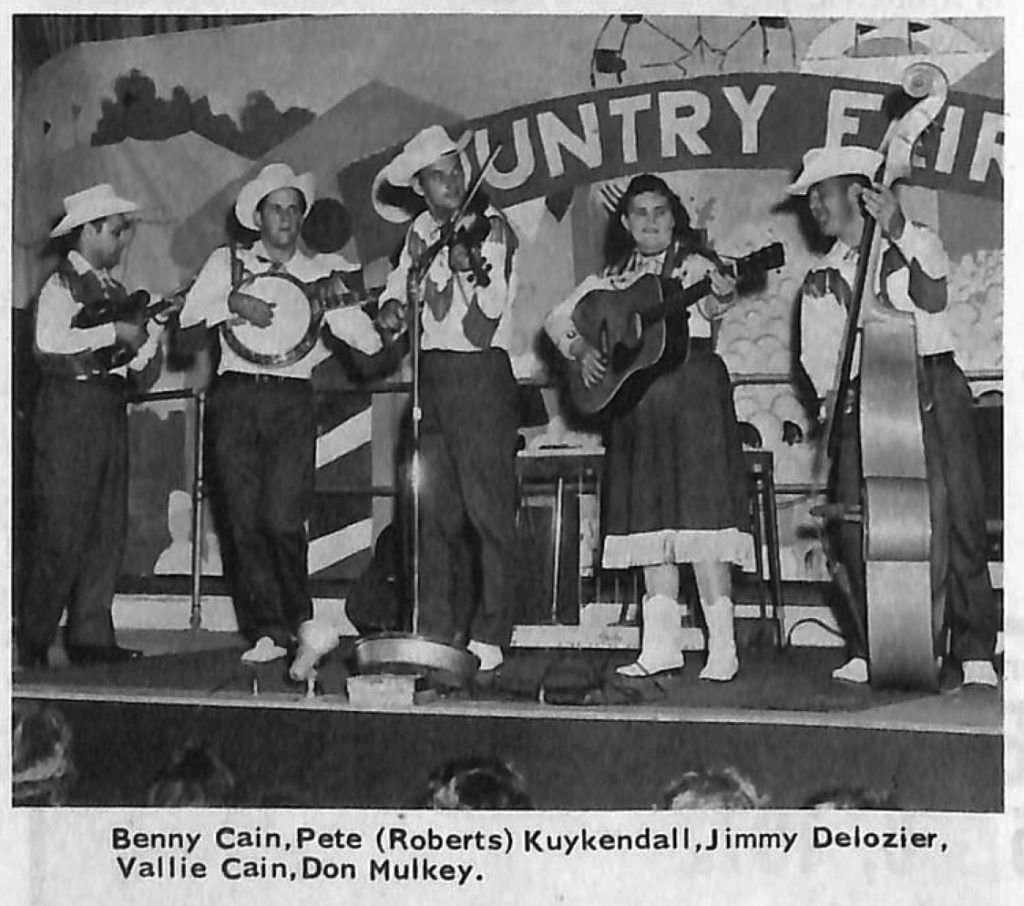
In November of 1968, the Country Clan cut three sessions for Rebel that were released on SLP-1484. It is an excellent set, with plenty of close duets, and clear, sturdy banjo work by Johnnie Whisnant. The material is all either original, or generally obscure numbers seldom recorded bluegrass style. There are several fine instrumentals, including what is probably the best banjo version of GRANDFATHER’S CLOCK ever recorded. The only criticism that has ever been leveled at the LP is the lack of a fiddle. Benny explained that at the time they were to record, their fiddler had just quit, and they didn’t have time to break a new one in. “There are numbers on that album that maybe should have had a fiddle break, but yet Johnnie was able to work them out on the banjo. He’s very adept at doing breaks on slow numbers…but had we had a fiddle, it would have taken some of the pressure off of him.” Fortunately, this LP is also still available from Rebel.
Benny and Vallie took a well earned rest in 1969, making no personal appearances, and only played a few shows in 1970. Then in January of 1971, they started appearing once again at the Maple Restaurant in Vienna. This engagement lasted six months. Band personnel at this time included Jimmy Delozier on fiddle, Joe Tanner of the Tanner Brothers on banjo, and Tom Gray on bass. In June, they moved to the Steak-In-A-Sack Restaurant in Manassas, Virginia, for a short while. They also made their first appearance on the bluegrass festival festival circuit, playing the ’71 Culpeper and Gettysburg festivals.
Right now, Benny and Vallie are between engagements, but have by no means given up their interest in music. They are planning to work the clubs once again, and are also preparing to record. “We’re working up some material now for an LP, and it’s more or less our responsibility how soon we can get ready to do it. We hope it will be sometime this spring. We’re also planning on having a songbook published. There hasn’t been any good bluegrass songbooks published in a long time.”
Benny and Vallie have been collectors for many years, and have accumulated a fine collection of songbooks, recordings and instruments. In addition, Benny is considered to be something of an authority on accoustical instruments. “We also eventually want to release a book on bluegrass instruments…mainly mandolins, but including the better five-string banjos, dobros, and guitars being used in bluegrass music…with pictures and information.” No matter what the future holds for Benny and Vallie Cain, their past accomplishments have already assured them of a niche in the annals of bluegrass music.
CREDITS: Most of the material in this article was compiled from taped interviews with Benny and Vallie Cain in Falls Church, Virginia on 8/8/71, 2/24/72, 3/8/72, and 3/11/72. They also furnished most of the photographs used. I would also like to thank Pete (Roberts) Kuykendall, Johnnie Whisnant and Dick Freeland for their assistance. WVS
BENNY AND VALLIE CAIN DISCOGRAPHY
BENNY AND VALLIE CAIN AND THE COUNTRY CLAN: ADELPHI
Angry Brown Eyes 47A
Roving Gambler 47B
Guitar – Vallie Cain
Mandolin – Benny Cain
Banjo – Pete (Roberts) Kuykendall
Fiddle – Carl Nelson
Bass – Tom Morgan
Recorded at Ratio Station WPIK, Alexandria, Virginia
August, 1956
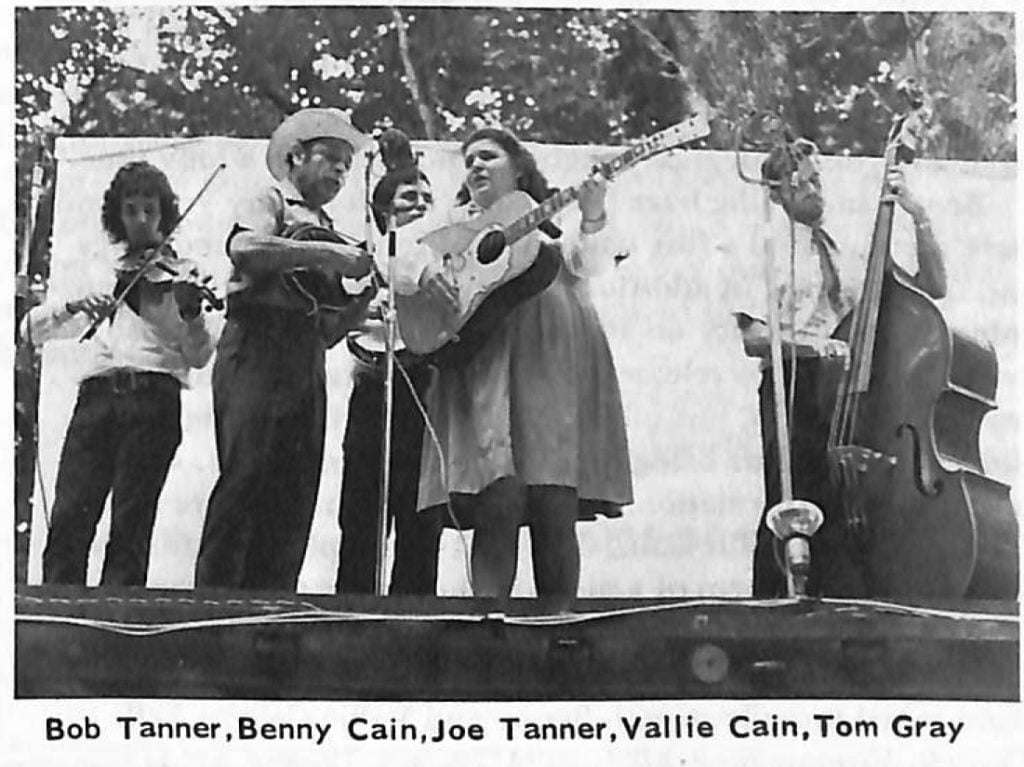
Note: Released only on 78 rpm.
BENNY AND VALLIE CAIN AND THE COUNTRY CLAN: REBEL New River Train/Ragtime Annie F-237
Guitar-Vallie Cain
Mandolin-Benny Cain
Banjo-Johnnie Whisnant
Fiddle-Jimmy Delozier
Bass-Don Mulkey
Recorded at Capitol Transcriptions, Washington, D. C.
December 17, 1962
Somebody’s Waiting For Me/Whoa Mule Whoa F-238
Angle Band/Seeing Nellie Home F-243
Personnel-Same as above
Recorded at Wynwood Studios, Falls Church, Virginia June 4, 1963
It’s a Weary, Weary World/I Wonder if You Feel the Way I Do/When Springtime Comes Again/The Convict and the Rose/My Love is Evergreen Drifting and Dreaming/Home Sweet Home/Long Journey Home/
Peacock Rag
Personnel-Same as above. Also, Pete (Roberts) Kuykendall sang baritone and played guitar on “The Convict and the Rose”, and Benny Cain played lead guitar on “When Springtime Comes Again.”
Recorded at Wynwood Studios, Falls Church, Virginia June 11, 1963
Note: All of this material was included in the “Bluegrass Spectacular Package, 70 Songs”, Rebel-1473, 1474, 1475, 1476.
THE COUNTRYMEN: PEAKE
Country Trumpet P-101
Virginia Feud P-102
Banjo-Johnnie Whisnant
Trumpet-Rick Gall
Guitar-Vallie Cain
Bass-Gordon Sturgill
Recorded at Rodel Studios, Washington, D.C.
Sometime in 1964
BENNY AND VALLIE CAIN AND THE COUNTRY CLAN:
REBEL SLP-1484
The Wolf is at the Door/Grandfather’s Clock/No One Dear But You/ Golden River/Rheumatism Blues/They Laid Him in the Ground/Rover, Rover/Johnny’s Rock/ls it Time/Watermelon on the Vine/F-5 Bounce/ You Don’t Love Me Like You Used to Do
Guitar-Vallie Cain
Mandolin-Benny Cain
Banjo-Johnnie Whisnant
Electric Bass-Paul Cain
Recorded et Roy Homer Studio, Clinton, Maryland November 3, 10 and 11, 1968
Share this article
3 Comments
Leave a Comment Cancel Reply
This site uses Akismet to reduce spam. Learn how your comment data is processed.
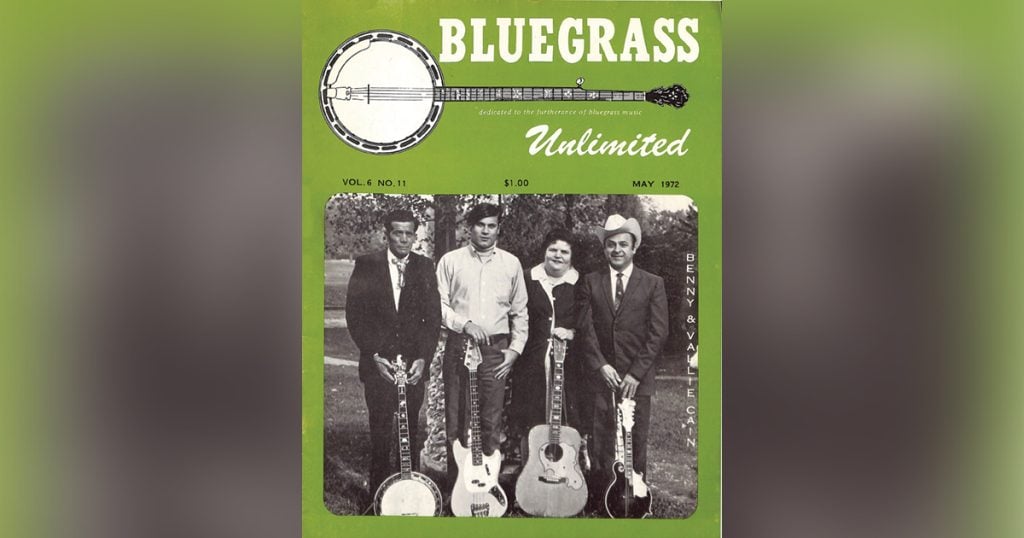
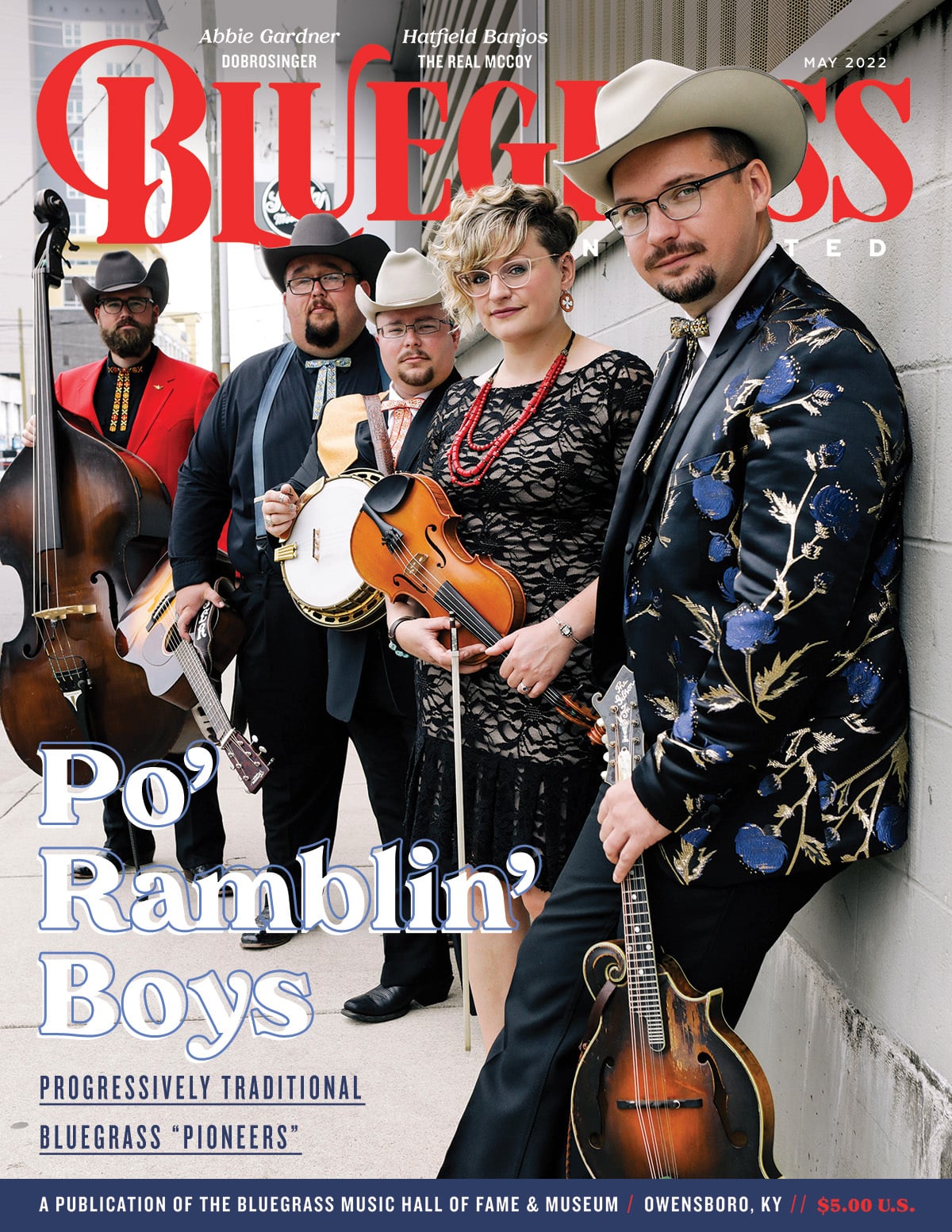
Are Bennie and Vallie still living today? This was very interesting . I bought three records on rebel from the late night show from lee Moore on wave back when I was a kid in the 60’s
Pray for peace.
Levi
Ephrata,pa.
No, Vallie, Bennie and their son Andre are all deceased now.
What ever happened to their recording of “Little Annie”? Is it still available on cd or an album by them? It used to be on YouTube music but no longer is. I love whisnants banjo playing On that one!